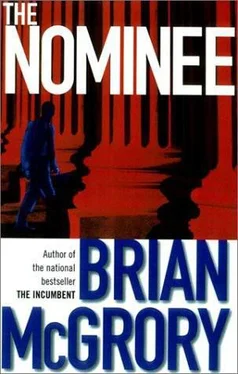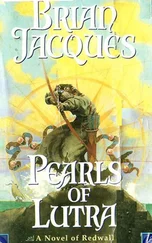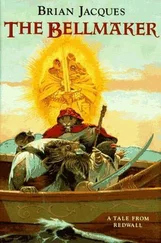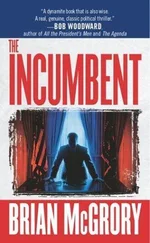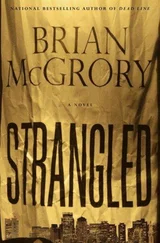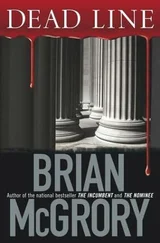The sun was now fully up over the distant buildings. A couple of morning joggers huffed past us, and Baker lay in the nearby grass chewing hard on a stick. All I could think of at the moment were the Campbell newspapers I had read before — papers that almost prided themselves in dumbing down to the lowest feasible denominator, papers so filled with color, graphics, and gimmicks that they madeUSA Today look like the trade publication for the American Funeral Home Association.
The owner, Terry Campbell, offered me a job once, and I turned him down cold. Now it looked like he’d have me in his employment after all.
Paul replied, “My guess is that they want a flagship paper, something to give them a greater level of prestige than they now have. And I don’t think money’s really a problem for them. They sure as hell don’t pour it back into the product.”
More silence as we both sat with our elbows on our knees, looking down. It was Paul who finally spoke: “My problem is that there are so many Cutter and Ellis cousins spread all over the country, two and three and four times removed, many of whom have never even been to Boston and probably don’t even read a newspaper. TheRecord doesn’t mean a damn thing to them. All they see is the stock price and a way to get rich off all the hard work of the people who busted their asses to make the paper what it is today.”
I said, “I don’t know anything about finances, and the only family trust that the Flynns had was that my father would come home from work every day. But can you leverage the value of your trusts to outbid Campbell on the others?”
“The banks have already told me no.”
He exhaled hard and looked away for a long moment. Truth is, I was worried he might be losing it. Then, to my relative relief, he said in a firm voice, “Jack, this newspaper, our newspaper, has won twenty-eight Pulitzer Prizes, including two last year. Our reporting has sent mayors to jail, had a United States senator impeached, blocked a Supreme Court nominee from confirmation, and unveiled the darkest possible secrets about the sitting president of the United States. God only knows how many other politicians stayed straight out of fear of us. God only knows how many times we’ve given voice to the voiceless on issues ranging from bank redlining to consumer fraud. God only knows how many times someone says to a friend or a colleague or a family member every single damned day of the week, ‘Did you see that story in theRecord? ’”
He paused, then added, “And now all that’s at risk. All of it.” In a much softer voice, almost to himself: “Every damned bit.”
And you wonder why I love the man. I mean, for chrissakes, you could have turned this speech into a television ad campaign and our circulation would go up 20 percent in a week.
Before I could say anything, he put his hand on my shoulder and looked me square in the eye.
“Jack, I’ve never told anyone this before, but this same jackal, Terry Campbell, tried making a run at us five years ago. We staved him off. John Cutter was the publisher at the time. I was the president. Everything was done in secret. It put so much pressure on us that John had that fatal heart attack.”
Paul looked down now, his hand absently drifting off my shoulder, down my arm, and then gone. He added, his voice much lower, “At least I hope that’s how he died.” Then he looked at me in silence.
I replied, “You’re suspicious?”
“I’m overtired and overwrought and I’m probably crazy. But this thing has been nagging at me. You know Campbell’s reputation. He gets involved in bloodbaths with his unions. People have died mysterious deaths. I’ve started asking myself questions I probably didn’t dare ask five years ago. What if he had something to do with John’s death?”
There was silence between us until Paul broke it, saying, “No, I’m just talking crazy.”
I said, “You want me to check it out?”
He turned to me again and nodded. “I’m not afraid, mind you. Sometimes I think that I love this newspaper so much that if I have to die for it, then so be it, and I know John felt the same way. But this battle’s going to be harder than before because of the breakup of the trusts. I want to know what I’m up against.”
I nodded and said, “Then I’m on it.”
He gazed hard at me, his eyes moving across the features of my face. “Thank you,” he said, and those two words said enough.
He pushed himself up from the bench and added, “I’m heading into the office. I have one or two ideas left to play out. Call me if you learn anything I should know about. This is all confidential, the hostile takeover and my suspicions. Right now, Brent Cutter doesn’t even know.”
With that, he walked across the grass in his stiff, familiar gait, past the tulip beds, past the statue of George Washington on horseback, and out onto Arlington Street, the weight of a family, of a first-class newspaper, of a city, on his shoulders. As I look back at the moment, I wish I had said something more to him, wish I had thanked him in some small way for all he had given, all he had done, and all he wanted to do. But in my current state — in fact, in any state — how was I supposed to know what was about to come?
ILIVE ON A HOUSEBOAT in Boston Harbor, a lifestyle not entirely congruent with the fact that (a) I hate the water, and (b) I hate boats. But best as I can tell, there was a regulation passed by the National Association of American Men that when any member of our exclusive organization goes through a divorce or particularly serious breakup, regardless of whether the split is the man’s decision, mutual, or that of his mate, he must live in a virtually unbearable situation for at least the next six months, if only to give him a fuller appreciation of what he once had but will never have again. No one ever said life was easy.
Still, I don’t mean to say that I hate the water as in,I hate the water. In truth, I like the water from the perspective of the shore, specifically, say, a powdery beach with a nice lounge chair and an Igloo cooler stocked with a 6-pack of icy cold Sam Adams Summer Ale, or the dining room of an oceanside restaurant where the grilled swordfish tastes so fresh you can probably find the captain of the boat that caught it knocking back a shot of whiskey at the bar. I did that once, went out to the bar and found him, but the union didn’t prove to be quite as climactic as you might expect. Another time.
It’s funny in life how too often you want what you can’t have, and have what you don’t want, or at least it’s funny how the human mind is able to contort things to make it seem this way. As I sat on deck, my laptop computer firing up on a small table in front of me, the warm morning sun beating down on my face, I drank in for the first time the remarkable harbor vista from this little perch off Long Wharf. Gulls were floating effortlessly in the pale blue sky and alighting on the creaky wooden docks. Massive yachts bobbed in the gentle waves. And in the distance, beyond the expanse of deep blue harbor waters, jets large and small ascended from the runways of Logan Airport like words taking flight in a poem. Behind me were the towers of the city’s stunning skyline gleaming in the midday light.
But another week and I’d be overboard, nautically speaking, and just as I was starting to like it. I had lived onThe Emancipation since October, when an old college friend, retired as a hedge fund manager long before his time, headed to the Caribbean for the winter and handed me the keys as an act of charity that men bestow on each other at times of such tumult. Now, just as the weather finally made such accommodations desirable, he was due back in five days, meaning I was to be out. Another itch in the occasional rash of life.
Читать дальше
